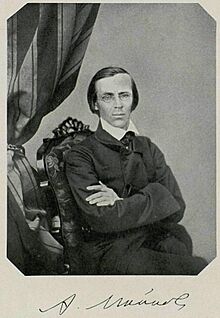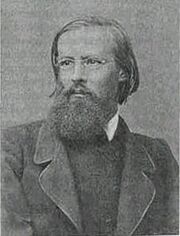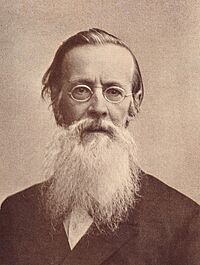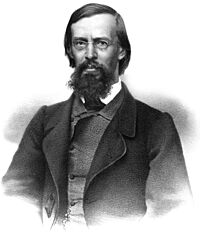Apollon Maykov facts for kids
Quick facts for kids
Apollon Nikolayevich Maykov
|
|
|---|---|
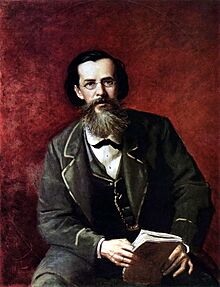
Portrait of Maykov by Vasily Perov
|
|
| Born | 4 June [O.S. 23 May] 1821 Moscow, Imperial Russia |
| Died | 20 March [O.S. 8 March] 1897 (aged 76) Saint Petersburg, Imperial Russia |
| Resting place | Novodevichy Cemetery, Saint Petersburg |
| Occupation | Poet, critic, essayist, translator |
| Nationality | Russian |
| Notable awards | Pushkin Prize |
Apollon Nikolayevich Maykov (Russian: Аполло́н Никола́евич Ма́йков, born June 4, 1821, in Moscow – died March 20, 1897, in Saint Petersburg) was a famous Russian poet. He is best known for his poems about Russian villages, nature, and history. He also loved ancient Greece and Rome, which he studied a lot. This love showed up in his writings too.
Maykov spent four years translating the epic poem The Tale of Igor's Campaign into modern Russian. He also translated folk stories from Belarus, Greece, Serbia, and Spain. He even translated works by famous writers like Heine and Goethe. Some of Maykov's poems were turned into music by Russian composers, including Rimsky-Korsakov and Tchaikovsky.
Maykov grew up in a family of artists. He was taught at home by people like the writer Ivan Goncharov. He started writing poetry when he was 15. After finishing school quickly, he went to Saint Petersburg University in 1837. He began publishing his poems in 1840. His first collection came out in 1842 and was well-received by the critic Vissarion Belinsky. After this, he traveled around Europe. He returned to Saint Petersburg in 1844 and kept writing poetry. He also started writing literary criticism and essays.
He continued writing throughout his life. Sometimes his views were more traditional, and other times they were more open to new ideas. But he always produced good poetry. He was friends with different writers depending on his views, like Fyodor Dostoyevsky when he was more traditional. Maykov passed away in Saint Petersburg on March 8, 1897.
Contents
Apollon Maykov's Early Life and Education
Apollon Maykov was born into a very artistic family. His father, Nikolay Maykov, was a talented painter. His mother, Yevgeniya Petrovna Maykova, loved books and even published some of her own poems. Apollon spent his childhood at the family's country home near Moscow. This house was often visited by many writers and artists.
These early memories deeply influenced his poems about nature. He had a special love for the old ways of life. In 1834, his family moved to Saint Petersburg. Apollon and his brother Valerian were taught at home. One of their teachers was Ivan Goncharov, who later became a famous writer. Goncharov remembered that their home was always full of life and new ideas.
Apollon started writing poetry at age 15. He and his brother even made two handwritten magazines. These magazines, called "Snow-drop" and "Moonlit Nights," featured Apollon's first poems.
Maykov finished his school studies very quickly. In 1837, he joined the law school at Saint Petersburg University. There, he learned Latin, which let him read ancient Roman books. He later learned Ancient Greek too. It was at the university that he developed his deep passion for Ancient Greece and Rome.
Maykov's Journey as a Writer
Apollon Maykov's first poems appeared in magazines in 1840 and 1841. He also studied painting, but soon decided to focus only on poetry. His university professor, Pyotr Pletnyov, helped him a lot. Pletnyov showed Maykov's early poems to famous writers like Vasily Zhukovsky and Nikolai Gogol. Even though Maykov didn't become a painter, his art lessons influenced how he saw the world and wrote.
In 1842, his first collection, Poems by A.N. Maykov, was published. It received great praise. The famous critic Vissarion Belinsky wrote a long essay about it. He especially liked the poems that sounded like ancient Greek writings. Maykov listened to Belinsky's advice. He later edited his poems based on Belinsky's ideas.
After university, Maykov worked for the Russian Ministry of Finance. He received money from Tsar Nicholas I for his first book. He used this money to travel around Europe. He visited Italy, France, and other countries. In Paris, he and his brother attended lectures on literature and art. This trip helped him write a university paper on the history of law.
In 1844, Maykov returned to Saint Petersburg. He worked as an assistant at the Rumyantsev Museum library. He became very active in the city's literary scene. He wrote for many leading magazines. He also started writing as a critic, reviewing works by artists.
In 1846, his poem "Mashenka" was published. In this poem, Maykov started writing in a more realistic style. Belinsky was again impressed. He said Maykov was a new talent who could show real life. Maykov also wrote short stories in a style similar to Gogol's.
In the late 1840s, Maykov became friends with writers like Nikolai Nekrasov and Ivan Turgenev. He also attended meetings with Mikhail Petrashevsky and met Fyodor Dostoyevsky. Maykov was questioned about these meetings but was not arrested. He later said he had only vague political ideas at the time. He never believed in socialist ideas.
In the 1850s, Maykov began to support a strong monarchy and traditional Russian values. He believed that only a system proven by history could work. In 1852, Maykov started working for the Russian Committee of Foreign Censorship. He worked there for the rest of his life and became its head in 1882.
Later Works and Changing Views
In 1847, Maykov's second poetry collection, Sketches of Rome, was published. This book was inspired by his trip to Europe. Some poems compared the grand ruins of ancient Rome with the everyday life of Italy. This collection showed his use of colorful and descriptive language.
From 1848 to 1852, Maykov wrote less. But he became very active during the Crimean War. He wrote poems like "Claremont Cathedral" (1853), which praised Russia's history. His collection Poems, 1854 included poems about the siege of Sevastopol. Some of these were liked by those who wanted change, while others were seen as supporting the Tsar. His poem "The Harlequin" made fun of revolutionaries. Maykov, now a supporter of the monarchy, praised the Tsar's rule. Some of his friends were shocked by his changing views.
After Russia lost the war, Maykov's poetry changed again. Poems like "The war is over. Vile peace is signed..." (1856) criticized corrupt officials. Maykov admitted he was wrong to believe in the Tsar so strongly.
In 1858, Maykov went on a trip to Greece. He had read many books about Greece and learned modern Greek. This trip resulted in two books: The Naples Album and Songs of Modern Greece. The Naples Album was about Italian life. Songs of Modern Greece showed his support for the Greek people's fight for freedom.
In the early 1860s, Maykov became very popular. He often read his poems in public. By the mid-1860s, he again moved towards more traditional views. He stayed with these views for the rest of his life. He criticized young radicals. He supported Russia's actions during the January Uprising in Poland. In his poems, he praised the Emancipation reform of 1861, which freed the serfs. This led to criticism from some writers. He became close friends with Fyodor Dostoyevsky.
In the 1860s and 1870s, Maykov wrote mainly for Russky Vestnik. He believed Russia had a special role in uniting Slavic peoples. He thought art should help Russians understand their history. His poems often focused on Slavic history and values. He also wrote about the importance of faith among common people. His later religious poems were very different from his earlier ones. They showed his belief in humility and that it would save the Russian character.
Maykov and Social Change
Maykov believed in connecting with ordinary people. He followed the style of famous poets like Pushkin. However, he was unsure about the ideas of writers like Nikolay Dobrolyubov and Nikolay Chernyshevsky. These writers believed literature should actively promote democracy. In 1853, Maykov wrote a poem asking Nekrasov to make his writing less angry. But he still respected Nekrasov's talent.
Maykov's poem Princess (1876) tells the story of a young noblewoman who joins a group of plotters. She loses her sense of right and wrong. However, Maykov saw these characters as victims of social problems, not just villains.
Translating The Tale of Igor's Campaign
Maykov found inspiration in Russian folk stories. He called them "the treasury of the Russian soul." He tried to bring back old Russian language traditions. Later in life, he translated folk songs from Belarus and Serbia. He also became interested in other cultures' stories. He wrote epic poems based on Scandinavian myths.
In the late 1860s, Maykov became fascinated by The Tale of Igor's Campaign. His son was studying it in school. Maykov found the existing translations unclear. He spent four years working on a new translation. He called this work his "second university." His main goal was to prove the old text was real, as some people doubted it. He ignored advice to use rhymes to make it modern. Instead, he created the first scientific translation with detailed notes. It was published in 1870 and is still considered one of his best works.
Maykov took his historical poems and plays very seriously. He wanted them to be accurate. In his play The Wanderer (1867), he used old writings from a religious group. He tried to turn these old texts into modern poetry. In his historical works, Maykov often thought about current Russian issues. He looked for connections between ancient history and his own time.
Christianity and Ancient Beliefs
Maykov's early work on early Christianity, "Olynthus and Esther" (1841), was criticized. He returned to this topic later in his play Three Deaths (1857). He wasn't happy with it, so he wrote a second part, "The Death of Lucius" (1863). Three Deaths led to his next big poem, Two Worlds, finished in 1881. This poem praised Rome's lasting glory. Its hero fought against Christianity, believing Rome was like another Heaven.
In his younger years, Maykov was very interested in ancient times. Later, he became more interested in Christianity and its struggles. Some people praised his fair and scholarly approach. But some Christian critics felt he was "too much of a heathen." They thought he didn't show Christianity correctly. Later historians liked his historical plays. They praised his fairness and understanding. For Two Worlds, Maykov received the Pushkin Prize in 1882.
Maykov's Final Years
In 1858, the first collection of Maykov's poems was published. A larger version came out in 1879. The Complete Maykov was published in 1884. In the 1880s, his poems focused on religious and national themes. In his last years, he wrote little new material. He mostly edited his earlier works for new collections. He lived a quiet life, focused on his art.
Apollon Maykov died in Saint Petersburg on March 8, 1897. People said his work was a strong and beautiful ending to the Pushkin era of Russian poetry.
Maykov's Lasting Impact
Maykov became famous partly because other great poets like Pushkin and Mikhail Lermontov died young. Many Russian thinkers felt a sense of loss. Vissarion Belinsky, who first noticed Maykov's talent, believed Maykov could fill this gap. Belinsky praised Maykov's first collection for its beautiful images and clear language. He said it was simple and not showy. Belinsky even said one of Maykov's poems was as good as Pushkin's best. However, he advised Maykov to move beyond just ancient themes.
Maykov's first collection made him one of Russia's leading poets. In the 1840s, his poems used more varied words and rhythms. But his style still relied on classical forms. There was a difference between his fancy words and his calm images.
After Belinsky died, Maykov's views changed. He moved between supporting Western ideas and supporting traditional Russian ideas. Critics then judged his work based on their own political views. His earlier poems were praised by Nikolay Nekrasov. His later works, which were more traditional, were supported by Dostoyevsky. Dostoyevsky often called Maykov Russia's most important poet.
The philosopher Vladimir Solovyov wrote in 1895 that Maykov's poems were calm and well-made. He said Maykov had a unique style, but his emotional side was not as strong. Solovyov felt Maykov's best works were powerful, even if not always musical. He noted that Maykov's poetry had two main themes: ancient Greek beauty and Russian history. He also mentioned Maykov's love for Russian nature. [[File:Maikov-pustinnik-1901.png|thumb|260px|Autograph by Apollon Maikov of his poem "Pustinnik" (Hermit)] The critic Yuly Aykhenvald said that Maykov copied classical styles more than other poets. He felt Maykov's early works were not very original. Aykhenvald thought Maykov's love for classics didn't fully let him dive into ancient pagan ideas. He wrote that Maykov was a scholar of ancient times. His poems with nymphs and muses were pretty, but you could tell that for Maykov, these were just myths, not real life.
Aykhenvald believed Maykov's strengths came from his painting background. He praised Maykov's ability to shape language like a physical material. He said Maykov's best poems were like perfect statues.
Another critic, Innokenty Annensky, noticed how painting and fishing might have influenced Maykov. He said Maykov was a passionate fisherman. This hobby fit his calm nature and his love for sunny days, which showed in his poetry. Annensky called Maykov a "master of meditation." He said Maykov was a rare person who found it easy to create beauty. Such poets produce clear ideas and images like sculptures.
Annensky also praised Maykov's skill with colors in his poems. He said Maykov's poetry had amazing energy and freshness. He felt that Maykov's connection to ancient heroes gave him eternal youth.
D. S. Mirsky called Maykov "the most representative poet of the age." He said Maykov was somewhat poetic and realistic, but not very emotional. Images were always key in his poems. Some of his short poems about spring and rain were very good. But his more realistic poems were too sentimental. His more "poetic" poems were not strong enough.
By the mid-1850s, Maykov was known for "pure poetry." However, he was not snobby. He always wanted to connect with people. He just didn't fully achieve his potential as a "people's poet." While Maykov might not be as famous as Pushkin or Lermontov, he holds an important place in Russian poetry. He greatly enriched it.
Maykov's deep knowledge of history helped Russian literature grow. His amazing works in the "anthological" style and his translations of classics helped warm up Russian literature. Maykov's best poems and his translation of Slovo o Polku Igoreve are considered classics of Russian poetry.
See also
 In Spanish: Apolón Máikov para niños
In Spanish: Apolón Máikov para niños
 | Delilah Pierce |
 | Gordon Parks |
 | Augusta Savage |
 | Charles Ethan Porter |


